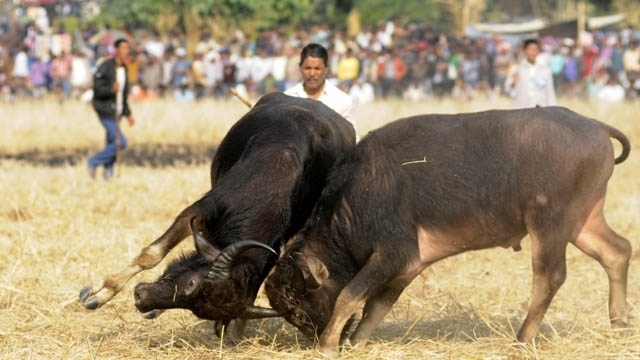(dna Research & Archives - File Photo)
The bench said it was "unimpressed" by the arguments that Jallikattu should be allowed under the supervision of the court by appointing court commissioners who could submit reports on the event.

Last ditch attempts to hold the traditional bull-taming sport of Jallikattu in Tamil Nadu during the upcoming Pongal festivities failed on Wednesday as the Supreme Court refused vacate its order staying the Centre's notification lifting the ban on the controversial game.
"We are not inclined to vacate the stay," a bench comprising Justices Dipak Misra and N V Ramana said after hearing the urgently moved pleas of some Tamil Nadu residents and a group called Compassion Unlimited Plus Action.
The bench said it was "unimpressed" by the arguments that Jallikattu should be allowed under the supervision of the court by appointing court commissioners who could submit reports on the event. It said the apex court's two-judge bench in its judgement in 2014 had discussed various facets of the age-old sport and expressed its opinion that bulls cannot be subjected to cruelty.
"Counsel for the applicant would submit that certain arrangements have already been made and responsible District Collectors have been appointed to supervise Jallikattu, and therefore, the order of stay passed by this Court should be vacated. The aforesaid submission leaves us unimpressed, for the simon-pure (genuine) reason (that) the two-Judge Bench of this Court, as it appears, had discussed many facets with regard to Jallikattu and expressed its opinion. The arrangements made on the basis of the Notification would not warrant alteration of our order and, therefore, we are not inclined to vacate the order of stay," the bench said.
The apex court remained unimpressed with the contention that Jallikattu was not a fight between bulls and humans but a game where the participants are required to embrace the running bulls by hanging on to their hump as long as possible and that the men are unarmed.
Further, the supporters of Jallikattu had submitted that the bulls were trained not to let the youngsters clamber on to their humps. They had also said that Jallikattu was a socio-religious festival and not an entertainment and people at various places in Tamil Nadu had immense faith in it for many a reason.
"Emphasis is laid on the culture of the state and the belief of the pastoral communities. In essence, it is urged that there is no cruelty is meted out to the bulls in such a festival or game," the bench noted while rejecting the submission.
Advocate N Rajaraman, appearing for the applicants, submitted that Jallikattu was a 3000-year old tradition and the apex court had never meant in Animal Welfare Board of India vs A Nagaraja judgement that there should be ban on it.
Further, he submitted that there was no justification or necessity to direct the stay of the Notification issued by the central government on January 7 at the instance of the Animal Welfare Board of India and others as they do not have any idea about the cultural base of the country.
"The age old culture of this country is perceivable in the villages but not in the metro cities where the representatives of the petitioners or the petitioners reside," he submitted.
However, the bench quoted paragraphs from the apex court's 2014 judgement and said "the aforesaid paragraphs clearly show that Jallikattu and other form of bull races cause trouble, pains and stress to the bulls and it is contrary to the provisions of the Act."
"Be it be ingeminated that the Court has adjudged the issue in the backdrop of Article 51(a)(g) and (h) of the Constitution of India. There can be no shadow or trace of doubt that the Constitution of India is an Organic and Compassionate Constitution," it observed.
The bench said on Tuesday it had already noted the submissions of opponents of Jallikattu to stay notification of the Centre lifting the ban.